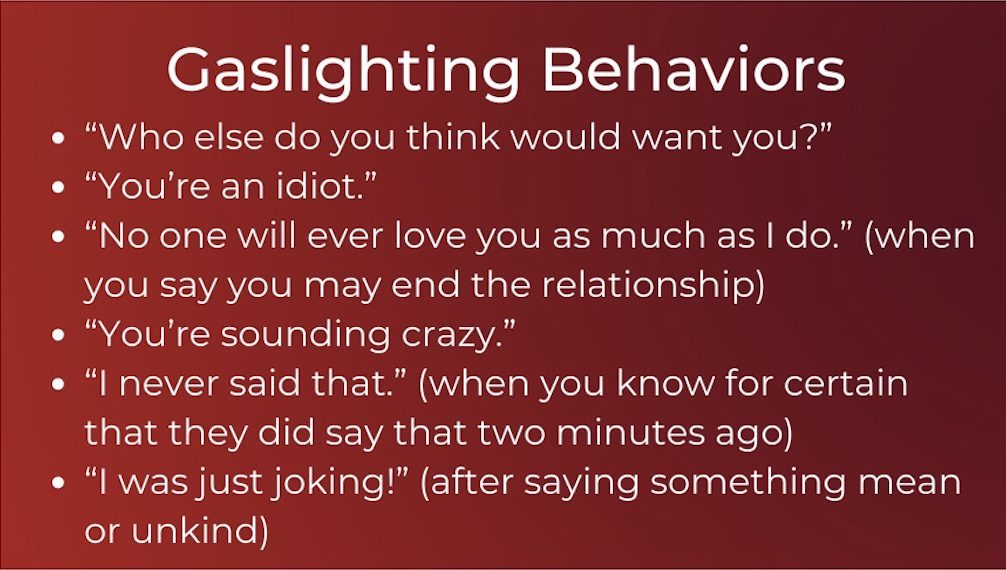
If you read these quotes and think, “Whoa, those are awful things to say to someone, much less to a significant other!” then you are correct. If you read any of the above and realize that your significant other has said something like that to you or someone you care about has received this treatment from their partner (female or male), then I hope you will read this post at least once. Maybe twice. Three times if needed. The above are classic gaslighting behaviors and are often directed at a romantic partner as a means of achieving dominance or control over you.
Gaslighting is a form of emotional abuse, and thus is a type of intimate partner violence. Like the more physical forms of domestic abuse, some countries have outlawed emotional abuse including France in 2010, the United Kingdom in 2015, and Ireland in 2018. While the United States passed the Violence Against Women Act in 1994, it unfortunately has no laws protecting individuals from emotional or psychological abuse. This is unfortunate for numerous reasons, one of which is that the effects of emotional abuse tend to be more severe and last longer compared to physical forms of domestic abuse.
I was in a romantic relationship with a gaslighter for a bit. To be frank, though my research interests include interpersonal relationships as well as abuse at work, I did not realize what was happening at the time. I wasn’t sure what was real and what was not. I just knew it felt really shitty to hear things like the above. It was only a year after I ended the relationship when a colleague wanted to study emotional abuse did I realize what had been happening in that relationship. The realization was shocking but gratifying because it meant that I wasn’t crazy. It was also mortifying to realize how I’d allowed myself to be treated for a time. Never, ever again. Gaslighting is a dealbreaker for me.
Gaslighting – The What
The term gaslighting comes from a 1944 movie called Gaslight, in which the husband, Gregory, tries to make his wife, Paula (played by Ingrid Bergman), go crazy by manipulating the gaslights in their home and carrying out other actions to make her question her own reality and thus her sanity. He does this so he can have her committed to an insane asylum, freeing him up to have power of attorney over her estate so he can take possession of extremely valuable family jewels. In the movie, Gregory engages in gaslighting as a specific and strategic means to an end and a highly financial one.
Gaslighting is done gradually over time—like boiling a lobster. This is why it is so hard to detect and so easy to fall prey to. Those who gaslight are not just mean all the time. No, they throw in positive words of affirmation here and there. If all you got was negative commentary, you could easily grasp the reality of the gaslighting situation. However, gaslighting individuals do not operate that way. They praise you, perhaps even in front of others, which contributes to keeping you off-kilter and questioning what is real or true. It is this mixture of denigration and affirmation escalating slowly over time that makes gaslighting so hard to put your finger on and why it is a common tactic of abusive partners.
The actions of gaslighting individuals do NOT match their words. For instance, a male gaslighter may talk a lot about being a feminist and his belief in equal rights for women. Remember, for gaslighters, their reputation and impression management are paramount. However, in your relationship with him, he insists on being the one who drives or who makes or controls all of the money in your relationship. Pay attention to a gaslighting partner’s actions, not their words. Their words are irrelevant and deceptive. It is their actions that matter and that actually tell the real story. Gaslighters use words to fool you. Their actions speak the loudest truth.
Gaslighting – The Who
A gaslighting partner’s psychology holds that he cannot tolerate the possibility of a challenge to his thinking, perspective, or opinion. It is his way or the highway. As one psychiatrist put it, a gaslighter “can’t tolerate the slightest challenge to the way he sees things. However he decides to explain the world to himself, that’s how you must see it, too—or leave him prey to unbearable anxiety.” This may manifest in conversations in which you express an opinion in contrast to the one a gaslighter espouses and can see him visibly tense up at the possibility that you may see things differently than he does. Within families or friend groups, the gaslighter’s insistence on not having any challenges to his perspective may even become a (not so) joking matter. That outright insistence sometimes even develops into a mantra touted by others that may sound like “Jerry is never wrong” or “Dad is always right.” The insistence that he is always right and must never be disagreed with is so strong and nonnegotiable that others adopt the rule as a saying or motto.
One noteworthy characteristic of gaslighting dynamics is that the gaslighter is usually male and the one being gaslighted is often female, though that situation is not without exceptions. Gaslighting and other emotional abuse can occur in same-sex relationships as well. Unfortunately, the male gaslighter/female gaslightee configuration most likely stems in part from men being socialized to be overly confident in their options and actions, and women being socialized to doubt themselves and apologize for upsetting someone. Think about it: when was the last time you heard a man apologize needlessly? It is a rarity.
Unlike the Gaslight movie, those who engage in gaslighting may not be cognizant of what they are doing. Some may be. Broadly speaking, those who gaslight a partner are not necessarily bad people; however, they are people who engage in destructive behaviors and relationship dynamics to feel more in control.
Effects on Mental Health
Emotional abuse of a partner, such as gaslighting, can result in a number of emotional and mental health outcomes. For example, those who experience psychological abuse by a partner are more likely to experience post-traumatic stress symptoms. In fact, empirical research consistently finds that while psychological abuse may predict post-traumatic stress symptoms, physical abuse often does not. Other research suggests that while all forms of intimate partner violence can lead to post-traumatic stress disorder (PTSD), the effects of psychological abuse are the most likely to result in PTSD. Those who experience emotional abuse are more likely to also experience shame (e.g., “I am bad”) as well as guilt (e.g., “I did something bad”) about being abused, and shame in particular increases the likelihood that she will develop PTSD symptoms. Further, the psychological effects of emotional abuse, such as gaslighting, linger much longer compared to those resulting from physical abuse.
Effects on Physical Health
In a study of 388 female and male college students, those who experienced psychological abuse from a dating partner—specifically, the form of psychological abuse marked by domination and intimidation—were more likely to experience physical symptoms, like musculoskeletal pain (e.g., backaches, joint pain), sensory or nervous system symptoms (e.g., tunnel vision, fainting), and stomach or abdominal symptoms (e.g., stomachache, bloating). This is not surprising in that decades of research demonstrate an inextricable link between our mental and physical health. In other words, if our health is suffering in one area, whether emotional, mental, or physical, it is probably suffering in one or both of the other areas, too.
Psychological abuse during pregnancy may come with additional health problems not just for the expectant mother but also for her baby. Women who are verbally threatened during pregnancy are twice as likely to deliver a low birth weight baby, and that effect is over and beyond the effect of the mother’s age, education, income, and number of children she already has. Further, women exposed to psychological abuse are at significantly greater risk of experiencing a miscarriage compared to those who did not experience such abuse.
Effect on Relationships
One outcome of a partner’s emotional abuse is the phenomenon of trauma bonding, which is similar to Stockholm Syndrome. With Stockholm Syndrome, someone being held captive comes to experience feelings of affection and trust for their captor. Psychologists describe Stockholm Syndrome as a coping mechanism or survival strategy. Similarly, those in an emotionally abusive relationship develop a trauma bond with the abusive partner. The abused partner often struggles to understand why the abuse is occurring and believes that if they become a better partner, the abuse will stop.
Unfortunately, emotional abuse such as gaslighting tends to follow the same pattern or cycle seen with physical abuse. Abuse occurs, the abused partner tries to be a better or more loving partner, the abusive partner shifts back to the courtship stage and offers flowers or other gifts to the abused, the abused partner forgives the abuse, and the abusive relationship continues and becomes more abusive. This cycle strengthens the trauma bond. It can also lead to learned helplessness where an abused individual comes to learn that abuse occurs in their relationship and they have no control over those events. This often results in inactivity by the abused partner. When combined with the messages of worthlessness communicated by an abusive partner, the abused partner feels powerless to make the abuse stop and yet sees no way out of the relationship because who would want someone so worthless?
Relationship with Yourself
Experiencing gaslighting behaviors by a partner is not just awful for our mental and physical health. Nor just for the health of the relationship with our partner. Being gaslit on a regular basis can wreak havoc on our relationship with ourselves. Allowing ourselves to be repeatedly treated with shocking meanness and disrespect leads to distrust in ourselves – in our ability to make wise and productive decisions. Because the (perhaps unconscious) goal of gaslighting is to make you doubt yourself and question reality, experiencing gaslighting often is a slippery slope to an increased lack of self-trust.
Bottom line: Some people may brush off mean things said by a significant other. However, over time these behaviors often escalate and increase in frequency, and when one tactic fails to work, a gaslighting partner changes up their approach. This is not necessarily because they are bad people. It is because they are people with an unusually high need for control and gaslighting is one way they try to achieve that control. This does not make gaslighting behavior excusable. These behaviors have a long-term impact mentally, physically, and in our relationship with our partners and with ourselves. Emotional abuse, like gaslighting, often leads to physical violence.
Come back next week when we look at how to respond to a gaslighting partner.






